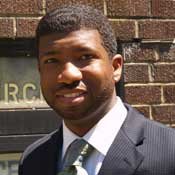I have long admired Martin Luther King Jr. and the movement that made him a global leader. I remember seeing a framed portrait of him while visiting a poor village in Brazil and being amazed by how global this southern black man was and is. The collective courage of ordinary southern people, embodied by this Baptist pastor and ecumenical theologian, helped to radically transform America's democratic experiment and change the world. I am the humble recipient of their stride toward freedom, and I owe much to King's audacious global vocation.
As a preacher, I've been discipled by King's ministerial vision, and I pray daily that I possess a modicum of his moral courage and conviction. He was by no means a perfect man or a saint, but his priestly and prophetic leadership during the movement models the kind of Christian leadership we need to see more of. King engaged his intellectual and spiritual powers to prophesy against America's failures to live out the meaning of its founding creed, and helped us all to dream of a more excellent, more human way to live together. The world was King's parish and the public square was his pulpit. Never shy of his black, southern Christian background, he stretched our consciousnesses by his radical inclusion of the Other. Jew and gentile, Protestant and Catholic, and myriad others were welcome in his congregation of liberty and justice for all.
What is often forgotten, or purposely ignored, is his love for poor people, the folks that mystic Howard Thurman called "the disinherited." King died preparing another March on Washington, a Poor People's Campaign that sought to incite a war against poverty. His antagonism toward racism, classism and militarism put him at odds with presidents and legislators who were seen as allies for black progress. Those of us who remember King must never forget about the least, lost and left out.
On the stormy eve of his assassination, he stood in the pulpit of Mason Temple Church of God in Christ. Though weary and under the shadow of death, he made time in that Pentecostal church for sanitation workers, for he knew that they too were children of God. His vision of human dignity, equity and solidarity—across colors, cultures and creeds—made him extremely unpopular toward his death, even among progressive whites and blacks. He dared to be more than a black leader, a civil rights leader. He was a prisoner of consciousness.
Now, a monument stands on the National Mall in his honor. The 30-foot tall granite structure is 11 feet taller than the other monuments nearby. Maybe it's symbolic of how tall faith erects us when we're on the right side of history. But I humbly submit that King would want us, in this generation, to be living stones of hope. Medgar, Malcolm, Fannie Lou, Mary McCleod and countless others would want us to be rocks of righteousness.
As we ponder the times and seasons in which we live, may we hope to have their kind of intelligent, courageous and moral leadership. May we prophetically and articulately call Americans to love mercy, seek justice and walk humbly before God. Even now, in the great state of Mississippi and throughout our beloved country, we must imagine again what it means to be architects of the beloved community.
We, too, can change the world.
Rev. CJ Rhodes, a Hazelhurst native, attended Ole Miss and Duke Divinity School in North Carolina, where he earned his master's of divinity. He worked as an administrative assistant to Dolphus Weary at Mission Mississippi, a Christian organization that works to bring people together. Rhodes is the pastor at Mount Helm Baptist Church, the youngest in the church's history.



Comments
Use the comment form below to begin a discussion about this content.
comments powered by Disqus